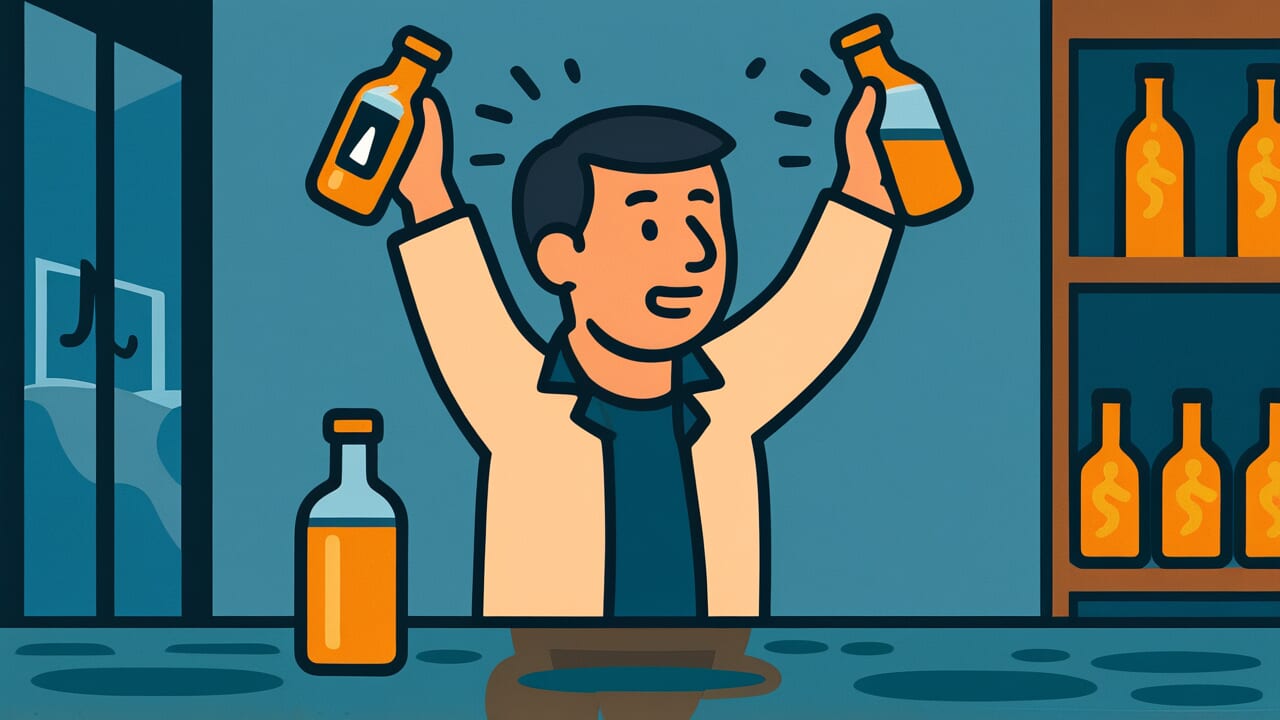How to Read “You can quit drinking, but you can’t quit the water that sobers you up”
Sake wa yametemo yoizame no mizu wa yamerarenū
Meaning of “You can quit drinking, but you can’t quit the water that sobers you up”
This proverb describes a fundamental human trait. Even when you decide to quit something, the habits and attachments connected to it are hard to break.
You might stop drinking alcohol, but the habit of drinking water to sober up remains. This means you can change your surface behavior, but the small habits and mental patterns attached to it don’t disappear easily.
People use this saying in specific situations. It fits when someone tries to break a bad habit, cut ties with a past relationship, or distance themselves from something but can’t completely let go.
This expression works better than simply saying “habits are hard to break.” The concrete example of alcohol and sobering water communicates the complexity of human psychology more deeply.
The proverb remains relevant today. You might quit using your smartphone but still check related apps. You might stop contacting an ex but stay sensitive to news about mutual friends. These situations show the same psychological pattern.
Origin and Etymology
No clear written records document the origin of this proverb. However, the structure of the phrase offers interesting insights.
Let’s focus on the expression “water that sobers you up.” During the Edo period, drinkers had a habit of drinking water after getting drunk. They did this to quench their thirst from hangovers or when sobering up. The body naturally craves this water after consuming alcohol.
The proverb’s cleverness lies in contrasting alcohol itself with the habits that follow drinking. You might quit alcohol through willpower. But the habits ingrained in your body from drinking days continue unconsciously. Drinking water when sobering up is one such action.
This expression brilliantly captures how deeply rooted habits are. You can change surface behaviors, but the small habits and mental movements attached to them don’t vanish easily. Someone likely discovered this human trait by observing drinkers in daily life.
The saying probably emerged from observing common people’s lives during the Edo period. Someone watching how people lived in taverns and tenement houses may have expressed this sharp human observation in a single phrase.
Usage Examples
- I quit smoking six months ago, but “you can quit drinking, but you can’t quit the water that sobers you up”—I still dream about smoking cigarettes
- My relationship with him should be over, but “you can quit drinking, but you can’t quit the water that sobers you up”—I still find myself listening to the music he loved
Universal Wisdom
This proverb offers deep insight into how difficult human change really is. We can make big decisions through willpower. But controlling the countless small habits and mental movements attached to those decisions is far harder than we imagine.
Why was this proverb created and passed down through generations? Because it perfectly describes the wall everyone faces when trying to change. Our actions consist of multiple layers—not just surface choices, but unconscious habits, bodily memory, and mental patterns.
You might make the big decision to quit drinking, but your body’s memory of craving water when sobering up remains. This shows that human change isn’t simply a matter of willpower. It’s a much more complex and delicate process.
Our ancestors didn’t view this human trait negatively. Rather, they gently teach us that change takes time. Don’t demand perfection from yourself. Small attachments and lingering habits are natural.
This proverb contains deep understanding and tolerance toward humanity. No one can completely cut off their past. Yet it warmly watches over people who still try to move forward.
When AI Hears This
The human brain has parts you can control with willpower and parts you cannot. This proverb describes that boundary line with surprising accuracy.
Drinking alcohol involves decision-making in the prefrontal cortex. This is where you can decide to “quit,” connected to the dopamine reward system. It becomes difficult with addiction, but theoretically willpower can reach this area.
Drinking water to sober up operates on a completely different system. Alcohol’s diuretic effect removes water from the body, raising blood osmotic pressure. The osmoreceptors in the hypothalamus then react, sending a “drink water” command at the brainstem level. This is a life-maintenance system like breathing or heartbeat, bypassing the cerebral cortex’s decision-making circuits.
In other words, alcohol is an emotional “want,” but water is a physiological “need.” The former forms through learning called reward prediction error. The latter is a homeostatic function programmed in genes. Research shows that just a 2 percent increase in osmotic pressure creates intense thirst, which is extremely difficult to ignore.
This proverb brilliantly identifies from everyday experience where human willpower reaches and where it doesn’t. Understanding the difference between these two systems is crucial even in addiction treatment.
Lessons for Today
This proverb teaches modern people a realistic and kind perspective on change.
When trying to change something, we often demand too much perfection from ourselves. We think we’ve broken a bad habit, then notice small related habits remain. This makes us blame ourselves. But this proverb tells us “that’s completely natural.”
What matters is not viewing lingering attachments and habits as failure. Quitting alcohol itself is major progress. If the habit of drinking water when sobering up remains, that’s just part of the change process.
In modern society, you might quit social media but still react to notification sounds. You might change jobs but still show habits from your old workplace. You might move to a new environment but drag old habits with you. When this happens, remember this proverb.
No one can completely cut off their past. But that’s okay. If you’ve taken a big step forward, you can gradually change small habits over time.
Your change is progressing at your own pace. Don’t rush. Be kind to yourself. Keep walking forward.



Comments